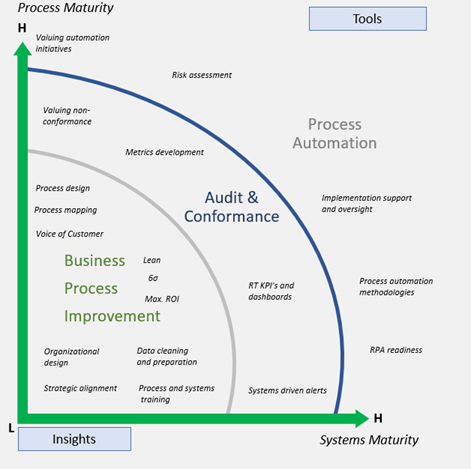Process mining can address common business challenges and provide actionable value. Consider how your organization can benefit using the data in your ERP, CRM and other systems.
Why Process Mining? Processes define the activities an organization conducts. Absence of standard process definition or lack of adherence to standard processes creates suboptimal outcomes. Process mining uncovers opportunities for value accretion. It is the single most important source of extracting value that an organization can pursue.
What is Process Mining? Most business activities can be viewed as processes supported by server and cloud-based systems. These systems, such as enterprise resource planning (ERP), customer relationship management (CRM), and supply chain execution (SCE), generate event, audit, or history logs. Process mining uses these logs to perform rapid, detailed analyses of business processes based on existing data, not aspirations.
The primary process mining steps are discovery, conformance, and enhancement. Discovery reveals current business processes and major process variations. Conformance compares a process model with an event log of the same process to reveal how they match-up. Enhancement is an analysis of a data-driven model for process optimization.
Where does Process Mining Effectuate Significant Benefits? The following ubiquitous business challenges have prompted organizations across a wide variety of industries to turn to process mining techniques.
-
Business Process Improvement. Embedding a culture of continuous improvement is imperative in today’s dynamic landscape. Process mining skips lengthy process mapping efforts, using real data and algorithms to quickly make existing processes clearly visible—allowing enhanced governance and oversight. Initiatives are no longer burdened by bias supporting visibility and real-time feedback on as-is processes.
-
Operational resiliency. At the process and systems level, organizations need the appropriate guard rails to mitigate operational and financial risk of their most critical activities. Process mining conformance techniques help auditing and compliance initiatives through complexity reduction, enhancement of organizational capabilities, and KPI development by comparing as-is processes to the intended design. This allows the organization to understand how well they can handle disruptions to their process.
-
Digital transformations. During the pandemic, digital transformations accelerated, enabling key strategic initiatives and, frankly, survival. Employees and consumers have adjusted to remote work and life. Process discovery enhances the impact of digital transformations by reducing implementation delays and risks due to misunderstood processes, manual routing, and process gaps.
-
Process automation. Process mining creates visibility and builds understanding of hotspots where robotic process automation (RPA) and task automation will deliver the most value. Process mining has proven to reduce the risk and implementation time of RPA projects.
Are you ready for process mining? The time needed to apply process mining is surprisingly short—when the data are there. According to Gartner Research, 80% of organization’s process mining effort and time are spent locating, selecting, extracting, and transforming the process data. Internal process mining and data cleansing expertise, missing process functions, and a complex IT landscape can hinder process mining efforts.
At SLKone we help clients gain insights into their processes and then properly utilize them. The framework in the graphic below helps explain where process mining techniques can benefit an organization most. It integrates the three challenges—business process improvement, audit and conformance, and process automation—with three process mining techniques—discovery, conformance, and enhancements, along a path to process and systems maturity. The italicized activities improve readiness for the process mining techniques and levels of process and system maturity.

Celonis Process Mining Software helps us turn your data into actionable, highly visual information that is of value across your organization. As management consultants with exceptional data skills, we collect and make sense of data for process mining applications. We also can deploy a suite of open-source tools to evaluate an organization’s process health, diagnose key issues, and develop and deploy process documentation and training. We help organizations use process mining to guide development of real-time operational dashboards that provide visibility and guardrails for key stakeholders within the organization’s ERPs and CRMs. We help clients using process mining to guide decisions and implementation related to digitization and automation.
Share this post: